Hyperreactio luteinalis (HL) is a benign condition whereby both ovaries enlarge and become polycystic during pregnancy, most often in the third trimester. HL is often mistaken for malignant ovaries and may be operated on under this false diagnosis.
Hyperreactio luteinalis is rare, and occurs with elevated beta human chorionic gonadotropin (bHCG). The cysts are thin-walled and multitudinous.
The ovaries become enlarged due to the benign theca lutein cysts and can be associated with a hydatidiform mole or choriocarcinoma. We’re not sure why it occurs, but it is believed to be connected to higher levels (or an unanticipated response by the ovaries to) human chorionic and pituitary gonadotropins. HL is most often found during cesarean section in the third trimester but can occur during any trimester. It appears as an abdominal mass.
There don’t appear to be any outward symptoms, despite elevated levels of certain substances in the blood, indicating another issue.
There is no treatment required for HL, since once the pregnancy is over, the hyperreactio luteinalis regresses. The most important factor is to ensure the ovaries are not malignant, and therefore only perform required surgery to remove ovaries. The results of ovaries being removed (an oophorectomy) is infertility.
HL is more common with multiple pregnancies, but can also be found in single-foetus pregnancies. HL doesn’t seem to often recur in the same person more than once.
There are a very limited number of cases of HL in recorded medical history that are not linked with trophoblastic disease.




